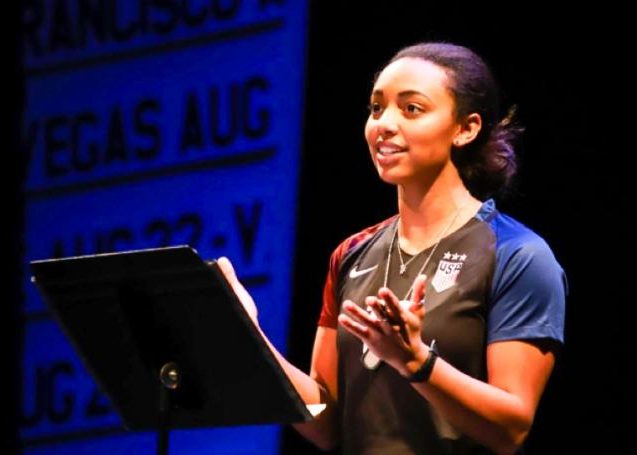Stephanie Everett, a junior studying a modification of sociology and African American studies at Dartmouth College, kicked off 2018 with a performance of her purely autobiographical one person play, “It’s Fine, I’m Fine” at the New Works Now festival for an audience of over 200 people.
Everett’s play centers on a character navigating the many struggles of modern day adolescence including mental health, relationships, sexuality and tough parents while suffering the affects of many traumatic brain injuries. Everett hopes audiences will take away two important themes from her show; the first is compassion.
“You never know exactly what someone else is dealing with,” Everett says. The second message is inner strength, and through this message Everett wants people to understand they are strong enough to overcome obstacles thrown at them.
Everett is no stranger to bruises as she started playing sports like karate, basketball and soccer since the age of four. Although her childhood involved many different physical activities, soccer and basketball stuck with her when she entered college.
An increased involvement in physical exercise raises someone’s risk of getting a fracture, and as Everett told me, she unfortunately fell victim to injuries during her sports career.
“I got my first concussion during my senior year of high school,” Everett says. Unfortunately, a second concussion came during her freshman year of college, and a third occurred in her sophomore year which Everett still suffers the symptoms of a year and a half later.
The medical diagnosis is Post-Concussion Syndrome, and patients have a continued experience of concussion like symptoms way after the normal period of recovery. According to the Concussion Legacy Foundation, subjects can experience diagnostics at any time, whether it be at rest or after too much physical activity. “I probably didn’t let them all heal as much as I should have before returning to play,” Everett says.
Everett participated in musical theater in middle school and high school yet, because of her time-consuming varsity sports commitments, she didn’t have time to continue the artistic passion in college. When she quit the soccer team during her sophomore year, she enrolled in a musical theater acting class taught by Carol Dunne, the Producing Artistic Director of Northern Stage, a professional regional theater in Vermont.
Dunne helped implement the creation of the Experimental Learning Term (E-Term) program which gives Dartmouth students the chance to work in a professional theater. With more time to do musical theater, Everett applied for the E-Term and worked with the company during the fall semester.
As she began her internship, Everett immediately felt accepted in the company. “I met everyone there was to meet both administration and production, and it was clear from the jump that this theater company is a family,” Everett says. “There is no divide between those behind computers and those behind power drills.”
On the first day of her E-Term, Dunne sat Everett down and suggested she write something about head injury, and the conversation launched the creation of her play. Due to this conversation and after working with Dunne, Everett gained the ability to tell her own story instead of the stories of others.

Everett also gained other knowledge during her E-Term. From working in the administrative office during the internship, she learned about the work behind various departments. However, she was far from a mousy office assistant that hid in behind their screen. In fact, during this time, she received her first professional acting gig, playing a mersister in “The Little Mermaid.”
As her internship grew to a close, Everett spent her last week working in the Development department. Indeed, her final assignment required her to find the contact information for promising playwrights. Specifically, many of those individuals are graduates of Yale’s drama school or already have plays produced in other regional theaters. Ultimately, her work would culminate in the playwrights being considered for Northern Stage’s festival, “New Works Now.”
Playwrights who get an invitation can submit to the competition, regardless, the Northern Stage typically receives over 100 submission for only three available slots. Only 25 minutes at this time, Everett presented what she had of her play.
Dunne sent Everett an email few days later saying she wanted to consider “It’s Fine, I’m Fine” for New Works Now, and it took her four months to create the final 55-minute version she used in her performance after the company chose to feature her piece in the showcase.
“It’s Fine, I’m Fine” received an enormous amount of supportive and positive feedback. More so, Everett was flooded with messages from the community, many of whom shared their own stories relating to concussions with her. Some stories involved a head injury that disappeared after a couple of days, while other testimonies experienced injuries that took years to heal.
The responses that Everett receives makes her even more passionate about raising awareness about traumatic brain injuries. Unlike other wounds that get more attention and can be treated with a cast or crutches, head trauma is invisible and doesn’t have a definite timeline.
“I think it’s important to raise awareness around this because my head injury penetrates every aspect of my life,” Everett says. “It is incredibly painful and isolating to not have control over your body’s control center.”
The title of Everett’s play, “It’s Fine, I’m Fine,” came to her on the first day she sat down to write her play as a result of her forced lifestyle changes. After living through over 550 days of feeling trapped by things she has to do, yet cannot accomplish, the catchphrase, “It’s Fine, I’m Fine” perfectly describes Everett’s daily struggles.
“At any given moment, I’d equate my general well-being to a moderate hangover,” she says. “But when asked, I say ‘I’m Fine,’ because no one really gets it. It’s not worth complaining about because it’s just a way of life for now.”
Instead of focusing all her energy on her restrictions, Everett sets an example for many by only looking at the victories she accomplishes every day and refusing to allow her condition to slow her down.

















